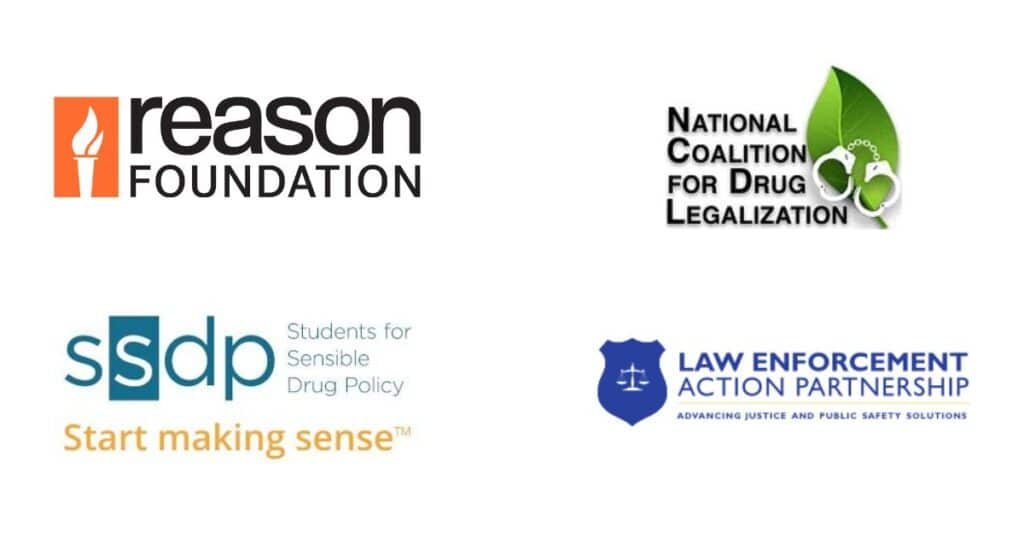The release of the Drug Legalization Handbook marks a significant moment in the ongoing conversation about drug policy and its impact on society.
Created by various advocacy groups, including Reason Foundation, The National Coalition for Drug Legalization, Students for Sensible Drug Policy (SSDP), and The Law Enforcement Action Partnership (LEAP), this handbook aims to serve as a catalyst for change. Its purpose is to spark conversations and critical thinking about the current state of drug prohibition and its impact on communities.

In recent years, there has been a growing movement towards the legalization of drugs. Many individuals and organizations have voiced their support for this cause, citing the failures and consequences of the current approach to drug use.
The contributors to this handbook represent a diverse range of viewpoints, all united in their belief that it is time for a change. By releasing this handbook, they hope to initiate a national conversation and bring about better policies and regulations surrounding drugs.
The Current State of Drug Prohibition
The current approach to drug prohibition has had significant consequences on society and individuals. Despite decades of efforts and billions of dollars spent, the War on Drugs has failed in achieving its intended goals. Instead, it has resulted in detrimental effects such as increased incarceration rates, particularly among marginalized communities, and a rise in violent crimes associated with the illegal drug trade.
Moreover, the unregulated nature of the illicit market for drugs poses significant safety concerns. Without proper standards and regulations, drug users are at risk of consuming impure or potentially dangerous substances. This has led to a rise in accidental overdose deaths.
The current state of drug prohibition is not only ineffective but also harmful. It’s time to consider an alternative approach that prioritizes public health and safety. The Drug Legalization Handbook provides insights into why legalization is necessary and offers recommendations for better policies. It’s time to have an open and honest conversation about drug policy reform.
Prohibition has had a significant impact on the rise of organized crime and violence. By making drugs illegal, it has created a lucrative black market that is controlled by criminal organizations. This not only fuels violence but also prevents regulation and quality control.
Furthermore, the lack of standards for purity and potency in the illicit drug market has resulted in countless overdose deaths. Without proper regulations and oversight, individuals are at risk of consuming dangerous substances that can have fatal consequences. This highlights the need for legalization and regulation of drugs to ensure safer access for all.
Understanding prohibition’s impact is crucial in recognizing the failures of current policies and advocating for change. The Drug Legalization Handbook delves into these issues and provides a comprehensive understanding of why drug legalization is necessary. It’s time to acknowledge the negative effects of prohibition and work towards a more effective and humane approach.
So, it is imperative that we continue these conversations and advocate for better policies that prioritize public health and safety. The release of the Drug Legalization Handbook serves as a starting point towards this goal and invites individuals from all backgrounds to join the discussion and support drug legalization reform.
The Drug Legalization Handbook
The Drug Legalization Handbook is a collaborative effort by various advocacy groups and experts in the field. Its aim is to provide a comprehensive understanding of the issues surrounding drug policy reform and present recommendations for better policies. The contributors to this handbook represent a diverse range of backgrounds and perspectives, offering well-rounded insights into the complexities of drug use, regulation, and prohibition.
The Drug Legalization Handbook shows prohibition has failed and how legalizing, regulating, testing, and taxing drugs could produce better outcomes for all involved. @PoliceForReform @ssdpofficial @ncdl_legalize @CatoInstitutehttps://t.co/CGKWtueB7z
— Reason Foundation (@ReasonFdn) October 31, 2023
Moreover, the handbook covers a wide range of topics, including the history of prohibition, its impact on society, public health considerations, and potential policy solutions. It also includes personal stories from individuals affected by current drug policies and their perspectives on why legalization is necessary.
While some may consider the views presented in this handbook as unconventional, it is crucial to acknowledge that the current approach to drug policy has not been effective. The Drug Legalization Handbook provides a thought-provoking and evidence-based perspective on why legalization is a viable option for better outcomes. It’s time to challenge traditional beliefs and have an open-minded discussion about drug policy reform.
“Much conversation and work has been done to detail why we should legalize drugs, but not enough effort has been done to show people how we can successfully legalize drugs in the current legal regime.” – Veronica Wright, Founder of the National Coalition for Drug Legalization
The contributors to the Drug Legalization Handbook make compelling arguments for why drug policy reform is necessary. Some of the key points include the need for regulation and harm reduction strategies, such as safe injection sites and access to clean needles. It also emphasizes the failure of the current approach in addressing issues related to addiction and mental health.
Furthermore, the handbook recommends policy changes that could lead to more effective and humane outcomes. These include decriminalization, which would shift the focus from punishment to treatment for drug use. It also proposes the taxation of drugs, similar to how alcohol and tobacco are regulated, as a means of generating revenue that can be invested in public health initiatives.
Perhaps the most significant recommendation is the complete elimination of the Controlled Substances Act, which classifies drugs as illegal and enforces harsh penalties for their possession and distribution. By removing this act, it would open up opportunities for drug regulation and harm reduction measures to be implemented.
The Importance of Conversation
The Drug Legalization Handbook is not only a valuable resource for understanding the complexities of drug policy but also serves as a conversation starter. It invites individuals from all backgrounds to engage in discussions and challenge traditional beliefs regarding drugs and their regulation.
Having open and honest conversations about drug policy reform is crucial in creating meaningful change. It allows for diverse perspectives to be heard and considered, leading to more informed and comprehensive solutions. The Drug Legalization Handbook encourages open-mindedness and critical thinking when evaluating its content, as it presents evidence-based arguments that challenge the status quo.
Moreover, by starting these conversations, we can continue to raise awareness about the failures of current drug policies and advocate for better alternatives. It is time to move away from stigmatizing and criminalizing drug use and instead focus on harm reduction, public health, and human rights.

Overall, the release of the Drug Legalization Handbook is a significant step towards promoting more effective and humane drug policies. It offers a comprehensive understanding of the failures of prohibition and presents viable solutions for reform. Let us continue to have these important conversations and advocate for change that prioritizes the health and well-being of individuals and society as a whole.
The Drug Legalization Handbook is not the end, but rather the beginning of this important conversation. As Mahatma Gandhi once said, “Be the change you want to see in the world.” Let’s be advocates for change and create a better future for all.
Enjoyed that first hit? Come chill with us every week at the Friday Sesh for a freshly packed bowl of the week’s best cannabis news!

















